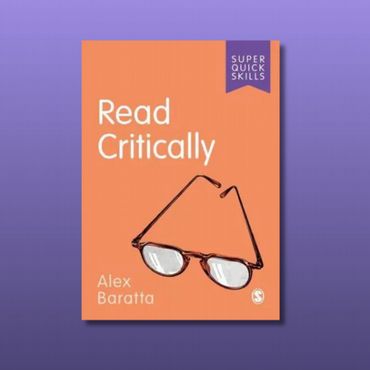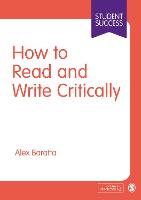HEJI: An Acronym for Being Critical
Being critical in your academic writing and assessment is the key way to achieving higher scores. It starts with reading your textbooks critically to then generate critical thinking on the subject, evidence for which is produced in the final stage: critical writing.
In terms of producing critical writing, below are four concrete steps which, if applied consistently to each and every essay, will help you achieve a more critical style. These four steps are captured within the acronym HEJI.

Never make your opinions, evaluations, interpretations and so on sound like facts. Ever. Whether interpreting previous studies/literature, or interpreting the results of your own future study, it's always a good idea to show a degree of caution - this is referred to as hedging. Compare the two sentences below, to appreciate hedging in action:

Now, which of the two sentences do you 'trust' more? If using words like 'prove', then you will need to be able to demonstrate, with 100% certainty, that Smith's results really are the most relevant to a particular field of study and explain why. How can one study, however, truly be held up as proof of anything, at least within the social sciences, for example (if you're looking for true facts, then the Hard Sciences are for you)?
But by using the word suggest, then you're essentially saying, 'I could be wrong'. This does not mean that you're lacking in confidence though; on the contrary, it shows you're being critical precisely because you've had to think carefully about Smith's study (or whatever else you're writing about) and ponder its merits. Having done so, you realise that nothing is proven and you need to tread carefully as a result. Thus, by hedging, you present yourself as a rationale and critical writer, and not an uncritical writer. If you look at professional journal papers online, you can in fact see the kinds of critical expressions the authors use as a means to hedge - below are some further examples:

You get the idea. So whenever you provide an interpretation of any kind in your writing, unless you can say with absolute certainty that you're discussing a fact, then always present your opinion as just that - an opinion (albeit an informed, academic opinion). And one clear way to do this and present yourself as a critical writer is to hedge your interpretations.

You may indeed hear of a need to 'engage with the literature' when writing your essays. This refers to the previous studies that you cite in your essay, whether you provide a direct quote, summary or paraphrase of such studies. But what does it mean to 'engage' with the literature? Well, what it doesn't mean is to simply summarise the previous studies and nothing more. If this is all you do with the literature you refer to, then your writing will be very descriptive - thus, uncritical. Summarising previous studies is merely the starting point, important though it is. Beyond this, what you then need to do is to interpret the studies - not all of them, but certainly most of them. And by interpreting the previous studies you refer to, it will show you are engaging with them precisely because you are telling the reader what you think of them. And there are four main ways you can engage with previous studies, theories, authors' views and so on:

Granted, it will probably take more than just one sentence (though not always) to reflect the four examples above pertaining to engagement, and two sentences do not a paragraph make. But the key point here is so far, so good. The writer is on their way to engagement with the literature - here, a study by Smith (2020) - by means of choosing one of four ways that demonstrate engagement. There are other ways, of course, such as finding links between studies and combining them to bolster a particular argument that you wish to make. But the four methods outlined here will provide you with concrete ways to engage with the literature and again, demonstrate a critical approach to your writing.

This particular aspect of being critical may be less relevant for most of your assignments and only really becomes necessary when you eventually write a dissertation/research paper, which normally happens in your final year of university. However, this doesn't mean that justification won't ever be needed for other contexts, to include pre-university assessments and essays. In this case, justify simply means that you explain to your reader in sufficient detail the reasons/rationale for the choices you have made in your assignment. Normally, this does indeed apply to dissertations, particularly when you need to explain the importance and relevance of your chosen research focus, as well as the reasons behind your chosen methods of data collection (e.g., an interview) and data analysis (e.g., thematic analysis).
However, consider that even in a short essay a bit of justification might go a long way - even one or two sentences of such can make a big difference. One example might be to justify your choice of a particular author or theory that you wish to focus on as the bedrock of your essay's discussion. Another example might involve justifying your essay's topic, if indeed you're given a choice of topic to write about. And below is a simple, but effective, example of how you can confidently signal your justification:
For this essay I have chosen to focus on women's representation in advertisements for the following reasons: First, in a society which champions equality and diversity, it is important to ensure that this is applied to everyone, and this includes gender representation. Second, given historical - and ongoing - issues tied to sexism in the media, this essay will also provide a historical comparison between current and past advertisements depicting women.
The kind of writing above is a good way to tell the reader to pay attention, seen with clear justification in expressions such as 'for the following reasons' and even topped off with the microlevel - but important - use of a colon. So if you get into the habit of talking your reader through the rationale for the choices you make in your assignment, this will show a critical approach because it demonstrates that you're aware of the importance and significance of the choices you have made and want the reader to be aware too. Remember, your reader(s), and subsequent marker, is not a mind reader, so all the more reason to explain your choices in detail.

This is perhaps one of the most crucial aspects of demonstrating a critical tone in your essays, yet one of the most ignored. Illustration involves, as you might expect, providing examples of what it is that you're writing about. But the important point here is that you need to provide examples for what are otherwise broad, even abstract, words/phrases/expressions and such in your writing. Because if you don't, your knowledge and understanding of the subject at hand will simply not be demonstrated to its best effect.
To start, look at the writing sample below. I wrote it as best as I could, on a subject I remember next to nothing about - high school physics:
Physics is a branch of science, which deals with all kinds of energy. Energy is important to us and the world, as it powers many things. Physics thus helps to explain the world around us in terms of the role that energies play in our daily lives.
As you can see, the short paragraph above does not really prove to the reader that I know much about the subject (which I clearly don't). My understanding comes across in fact as rather superficial. Now imagine writing like this throughout your essay - it will be hard to achieve a high score precisely because your writing will be nothing but broad description, as opposed to specific and concrete critical discussion. So here is the acid test for your writing: when you use a broad word/s, a word/s which has multiple understandings/applications, make sure you provide a clear example to follow. This applies to words that are technical and non-technical alike, and applies to quotations you use or your own words. If you do this consistently throughout your essay, then you will build - example by example, paragraph by paragraph - a truly critical essay, which fully demonstrates your critical writing ability; produces concrete writing; helps the reader follow your train of thought; acts as support; and most of all, proves that you understand what you're writing about. That's a lot of benefits from illustration!
Consider the sentences below, one from a student's essay and one from a direct quotation (presumably to be used in the student's essay). What do you think are the broad words?

In the first example, 'service' and 'local communities' say everything and nothing at the same time. We don't really need definitions of such words; we need examples. What do these broad words mean to you as the writer? It is your job to let the reader know and in doing so, demonstrate your knowledge base. 'Service' can refer to mental health and physical health provision, but what kinds of mental health or physical health issues?
Likewise, within the quotation, 'film analysis' and 'culture' are huge words - they can mean so many things. Film analysis can involve the themes within a given film, or the way the director uses light, colour or editing. And culture is vast - do we mean culture tied to a given country, or a particular ethnic group or race? Such broad words could of course refer to multiple things, but you only need to provide one example at a time, of course. How about the following?
The NHS needs to provide more service to local communities. This is seen with a lack of mental health provision, notably help with anxiety, in small towns adjacent to large UK cities.
According to Jones (2021: 12), 'film analysis can reveal a great deal about a given culture'. The films of Martin Scorsese, for example, often depict Italian-American culture, seen with extended scenes of family gatherings at the dinner table or celebrations, involving a large meal, wine and conversation to bring everyone up to date.
Again, we're not done yet. It will take more than one sentence to complete the two paragraphs above. But what we do have is a good start, consisting of illustration of broad words such as service, local communities, film analysis and culture. From here, it's up to you as the writer to then plan your next move, which might involve bringing in additional literature (for the first example, perhaps a NHS report), and then engaging with the literature; providing further illustration (e.g., you could reference a particular film scene from a specific Scorsese film). As you can see, being critical is not hard to fathom - it consists of in large part ticking boxes, pertaining to hands-on techniques which, if applied consistently throughout your essays, will help you on your way to being a truly critical writer.
As a final example, let's now look at two paragraphs. The first ignores all the advice provided. In other words, it doesn't hedge, doesn't engage with the literature, doesn't justify, and doesn't illustrate broad words. The second example, however, does all of the above. Don't just read the two paragraphs but read them critically, to truly appreciate the difference:
It is undeniably easier to acquire our native language as infants than it is to learn a foreign language as adults. Therefore, children must start to learn languages earlier in British schools, from six onwards, and learn at least one foreign language for all six years of primary school. Berisha (2018: 12) explains that 'learning a foreign language means learning a new culture'. Culture is very important in today's world, so children need to be proficient in more than just their native language.
Arguably, it is perhaps easier to acquire our native language as infants than it is to learn a foreign language as adults. Therefore, if children start to learn languages earlier in British schools, from six onwards, and learn at least one foreign language for all six years of primary school, this can give them a solid foundation in becoming, partly at least, bilingual. Berisha (2018: 12) explains that 'learning a foreign language means learning a new culture'. This is relevant more than ever nowadays, given increased travel and subsequent exposure to people from all languages - and cultures. Indeed, learning the various words of a foreign language, such as the Korean word nunchi, can help us to understand a foreign culture better, by virtue of understanding the concepts that it deems important. Thus, this is one reason why it makes sense for children to be proficient in more than just their native language.


More articles in this category:
- Why Should Critical Thinking be on your Radar?
- What skills will I develop from undertaking a social science research project?
- Avoid lazy writing in your academic essays
University of Greenwich, Student Support
For more information and support on this topic from the University of Greenwich - please click here



